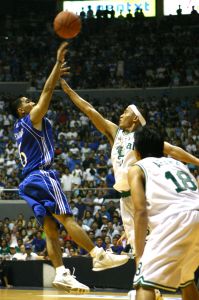 
|
Have you realized yet that coaching basketball is not as easy as it looks?
Don’t worry, no matter what level you’re at when it comes to helping and guiding your team, you’ll find the help you need on our site.
Yes, there’s quite a bit to know when it comes to coaching basketball successfully but we’ll help you break it down into broad areas for you to concentrate on.
If there are any coaching specifics we don’t go into here, we’ll let you know where to find more details so you can continue to improve as a coach.
Our goals are to help confirm the things you’re already doing right,
open your mind to other ideas and to make sure you’re always getting
better.
On this page, we’ll start with some basic coaching basketball fundamentals. As you read through this info, explore the links you find that lead to further education. At the very bottom of the page, you’ll find a list of links to all of our coaching basketball education pages.
Ready to get better at coaching basketball? Let’s go!
 |  |
Basic Fundamentals of Coaching Basketball
1) Understand the Game – It’s imperative that your team understands the basic rules and tactics of the game of basketball. And that has to start at the top – YOU.
If you really explore our site, you’ll find a wealth of information all in one place on subjects such as plays, drills, fundamentals and and much more.
You should also seek out books and videos on coaching basketball, attend basketball clinics, watch basketball games on TV and talk to other coaches with more experience. Search out information through as many sources as you can.
2) Character – If you want your players to carry themselves with a high moral code, you need to show them the way. You must show them what a true role model is. How do you do this?
Start by being consistent. When you say you’re going to do something, be sure you follow through with it. Be sure your team always sees you under control no matter the situation. Show your team that any situation can be handled by staying in control of your emotions.
That doesn’t mean you have to sacrifice any of your fire or intensity. It just means handling all the things that come up in practice and games without flying off the handle. If the coach can’t show character, how can the players be expected to?
Character is also shown when you can admit you’re wrong when you make mistakes. Your team will develop much more respect for you if you apologize when you make mistakes rather than trying to set yourself above the standards you expect of them. It’s OK when this happens. You’re human and we all make mistakes. Just don’t try to cover them up or hide from them. You’ll be amazed what that’ll mean to your players.
3) Communication – Since this is a detailed subject all by itself, we’ve developed a how to communicate better page. Check it out to improve your communication skills.
4) Make it Fun – Being able to enjoy the process is vital to a team’s success. If practice is all drudgery and no fun, you’ll lose your players quickly. Strive to strike a balance between serious learning and a laugh or two.
Allow for a little humor when mistakes are made. When players want to laugh and get loose once in awhile, take it as a sign that they’re having fun, not that they’re being disrespectful. Keep practices fun and keep all players involved in the process.
5) Be Positive – Nothing will kill your players more than a negative attitude. A positive attitude will unleash your team’s full potential and keep you above the competition.
Yes, bad things will happen. Your players will make mistakes at the absolute worst times. You’ll make bad calls or decisions. Above all else, keep things in a positive light and move on. The only things you can control are you attitude and your actions. Everything else is outside of your control, so don’t get negative when those things upset you.
Make sure your experience coaching basketball is an over-all positive one for both you and your players.

